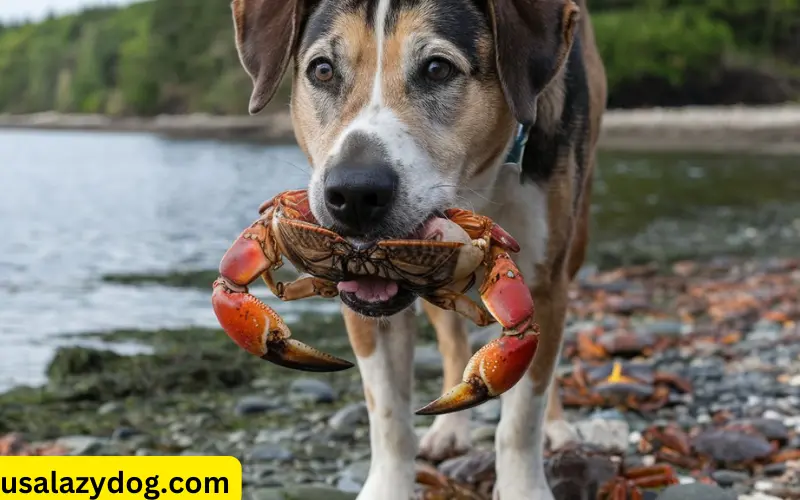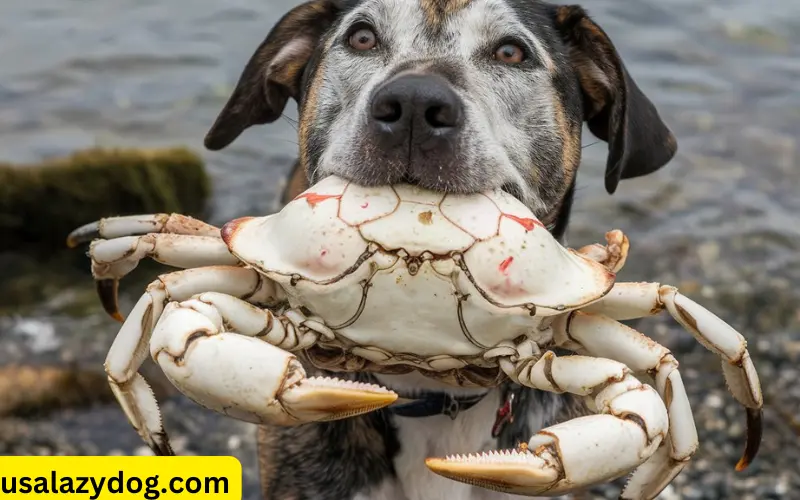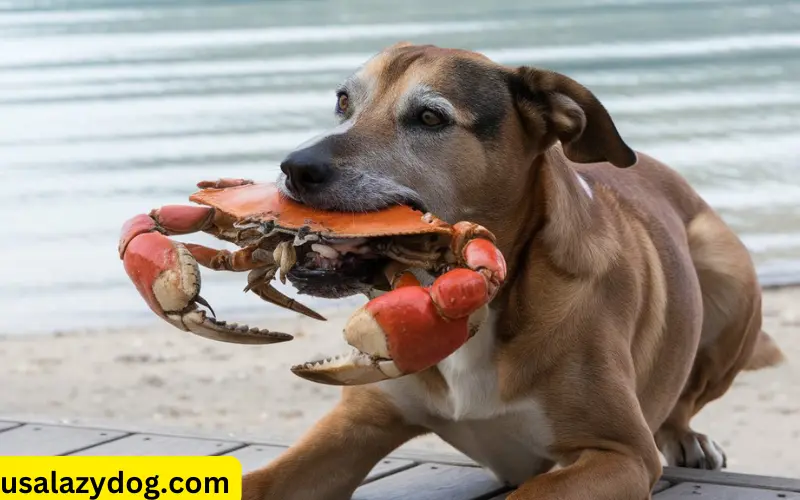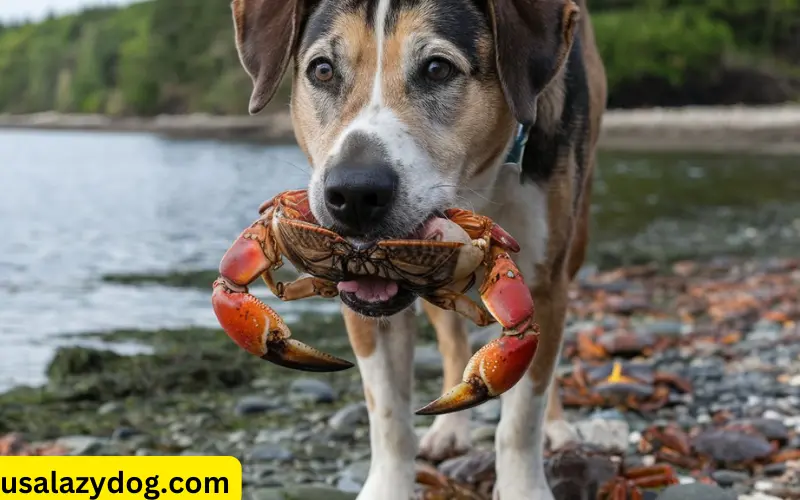
Can Dogs Eat Crab Shells? The succulent flesh found in crab legs may appeal to both people and canines. The issue that has to be answered is what will become of the shells.
Although sharing seafood with your partner is a good idea, crab shells may be a considerable risk to dogs if they are not handled with care.
This page will provide you with information on crab legs, crab shells, crab that has been cooked, and soft
crab shells.
Can Dogs Eat Crab Shells?
Dogs may consume crab shells, but only in small amounts. Consuming excessive crab shells might lead to digestive issues in a dog.
Detailed information on the health benefits and hazards associated with crab shells is provided in the following review.
The Potential Dangers Involved When Dogs Consume Crab Shells
When dogs consume significant quantities of crab shells, they may have a variety of adverse consequences, including indigestion and intestinal blockage, in addition to a wide range of other severe and sometimes life-threatening issues. It is reasonable to presume that a dog has been infected with crab shells if it suffers frequent vomiting or diarrhea episodes.
In addition, the shells include a trace amount of chitin, which, if swallowed, may be very hazardous to one’s respiratory system. Dogs can consume crab flesh; nevertheless, owners should use caution while giving their pets this food.
Avoid eating the shells of crabs since they are high in protein. Ensure your dog is always under constant and close supervision, and do not allow them to go to the beach. It is because they may have access to crab or imitation crab sticks, which might lure them to consume a significant quantity of shells.
The Reasons Why Dogs Should Avoid Touching Crab Shells?
Crab shells may pose several dangers to dogs, which are detailed below.
Sharp edges: Crab shells contain sharp edges, which may be harmful to your dog’s oral cavity, throat, and digestive system if they are picked up or swallowed out of their mouth. As a consequence, infections may occur.
A dog that consumes significant bits of shell may choke. The fragments may get stuck in the throat, causing the dog to choke.

If your dog has an intolerance to crab, is this possible?
Some dogs can have negative responses to shrimp, even though it is safe for dogs to consume and is a beautiful source of protein. To ensure that your dog can digest shellfish without difficulty, you should introduce it to your dog gradually.
On the other hand, some dogs are intolerant and cannot handle consuming foods such as crab, which may lead to complications. As a result, it is preferable to keep crabs away from dogs that are intolerant of them.
Would It Be Appropriate to Give Your Dog Seafood?
In conclusion, it is recommended that dogs consume seafood. It is nutritious and provides necessary elements such as omega-3 fatty acids, which benefit the dog’s skin and hair.
When it comes to feeding your dog seafood, exercise caution since some items, such as shellfish, can potentially cause extensive injury to dogs. However, before feeding your dog fish, you should get
the advice of your dog’s veterinarian to determine whether or not seafood is healthy for him to
consume.
If a dog were to consume a crab shell, what would happen?
A dog may have the following issues if it consumes many crab shells.
Digestion concerns: Because of their fibrous structure, crab shells may affect your dog’s digestive tract, leading to various other digestive disorders, including constipation, diarrhea, Or stomach discomfort. These symptoms manifest themselves when the shells cause a blockage in the stomach, which hinders digestion.
Because crabs’ shell currents are very sharp, they may have suffered lacerations or puncture wounds to the mouth, throat, or digestive system. These injuries can result in discomfort, infection, or even more severe problems.
What You Should Do If Your Dog Consumed Shells of Crabs
Immediately seek the advice of a veterinarian if you have any reason to believe that your dog has eaten
a significant number of crab shells. Observe the directions that are provided below.
Determine the quantity of shells the dog has consumed, and consider the dog’s condition if it is not too severe. If you know the dog has eaten the shell, analyze the issue.
When you experience a medical emergency, you must contact your veterinarian so that you can recover as quickly as possible before the illness becomes deadly.
In this circumstance, anything might happen to the dog, so it is essential to check it carefully.
Your dog may beg for water now, so keeping an eye on it is essential.
Symptoms that may indicate that your dog has eaten crab shells
Pay attention to the symptoms that are outlined below. If your dog exhibits any of these symptoms, your dog has likely eaten shells or crab eggs.
Vomiting: If your dog throws up regularly, that is, ten to fifteen times a day, you should contact the veterinarian as soon as possible and let him know about the situation.
Discomfort in the abdomen: When a dog consumes a significant quantity of crab shells, it experiences considerable stomach pain. Additionally, the dog exhibits signs such as restlessness and hyperactivity.
Lethargy: If your dog often feels sluggish or lethargic rather than carrying out his obligations, this might be another sign of a crab impact.

Are Dogs Allowed to Consume Crab Meat?
There is no doubt that shrimp is an excellent source of protein. Food that is high in nutrients and protein
is something that dogs like eating, and the ideal choice for them is crab. Your dog can consume anything, even the skin, legs, and eyeballs, albeit the crab flesh is the one exception.
On the other hand, it will never be able to consistently include crab in its diet since eating excessive crab may result in gastrointestinal distress, vomiting, lethargy, and restlessness, which might cause many issues. Crabmeat should only be given to your dog if it has been thoroughly cooked and is fresh.
Conclusion
Can Dogs Eat Crab Shells? Dogs can consume crab shells, but only in moderation. Consuming excessive crab shells may result in various health issues, including indigestion, vomiting, restlessness, and lethargy. Dogs can also consume crab flesh, which is an excellent source of protein because crabs are so abundant.
It is best to avoid bringing your dog to the beach for an extended period since he can potentially consume a lethal number of shells. As a snack, a dog could like eating a cecum.
